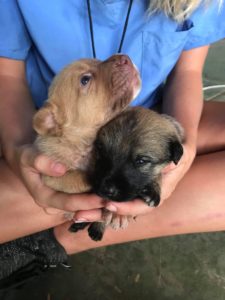 This summer I had the opportunity to go on a World Vets trip to the Dominican Republic.
This summer I had the opportunity to go on a World Vets trip to the Dominican Republic.
World Vets is an international veterinary aid organization that brings veterinary services to underserved areas while providing educational opportunities for veterinary and technician students.
During our weeklong trip, our team of six veterinarians, four students, four technicians, and two assistants worked to spay and neuter dogs and cats in and around the cities of Cabarete and Sosua.
Though I have worked in clinics and seen many of these procedures before, this was unlike anything I had ever done. We worked in a “field clinic” in the back of an abandoned building; there was little power and only the medical supplies we brought.
Additionally, all of the animals we spayed and neutered were street dogs and cats with no access to medical care. Most were malnourished, covered in parasites, and anemic from tick-borne diseases.
Many had other health concerns that we addressed, and some even had conditions we don’t see in the U.S., like screwworm and transmissible venereal tumors.
Despite all of that, we were able to treat and sterilize more than 300 dogs and cats in three days.
My role as a student was to work rotations in induction, anesthesia, and surgery. Not only was I placing catheters, intubating, and administering drugs, I also had the opportunity to perform spays and neuters with the supervision of the veterinarians.
All in all, it was amazing to see how veterinary medicine can be adapted to any situation.
Though the trip provided invaluable experience for me, I like to think it had an even greater impact on the communities of Cabarete and Sosua.
